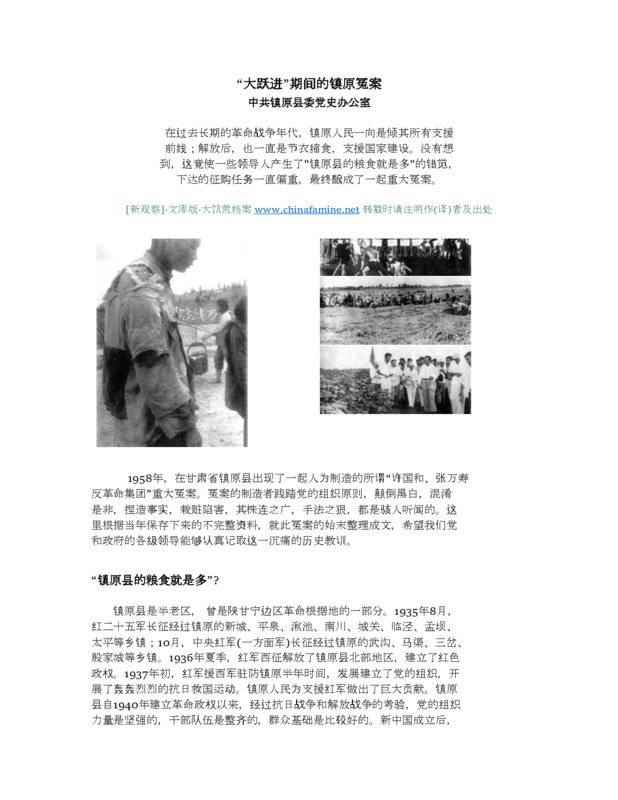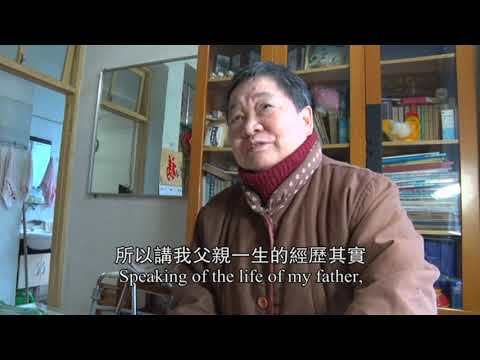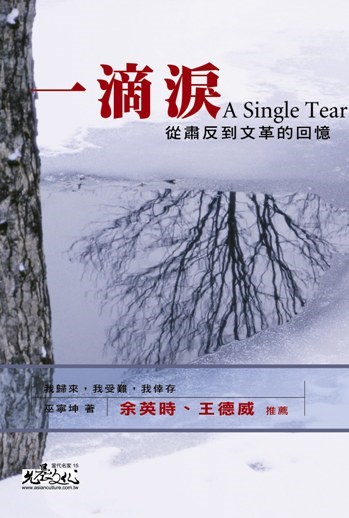Explore the collection
Showing 14 items in the collection
14 items
Film and Video
East Wind State Farm
In 1957, two hundred teachers, students, and cadres from Kunming, Yunnan were among the hundreds of thousands of Chinese people labeled as “Rightists” for criticizing the Chinese Communist Party. They were sent to the East Wind State Farm, located in Mi-le County in Yunnan, for 21 years of “thought reform” in the countryside. These inmates witnessed the policies of the Great Leap Forward first-hand: they took part in deforestation, agricultural, and industrial projects in the countryside, which precipitated the Great Famine. Later, during the Cultural Revolution, their camp was visited by large groups of youths “sent down” from the cities, who worked on the farm with the “Rightists.” In 1978, these “Rightists” were finally rehabilitated and allowed to leave.
This documentary examines the policies and campaigns of the Maoist era through the eyes of those who were persecuted and exiled. Director Hu Jie pieces together this long and complex story through collecting dozens of extensive interviews with inmates as well as staff who served through decades of the camp’s existence. These people’s vivid memories and personal accounts shed light on the harrowing lifestyle of not only the two hundred “Rightists” of East Wind State Farm, but also the scores of dissidents and youths who experienced the Great Leap Forward and the Cultural Revolution.
Periodicals
Examination of the Great Famine of the 1960s in China
This book documents the situation of people during the Great Famine, reflects on the causes of this tragedy, and candidly criticizes the practices of the time, which ignored the laws of the economy and put class struggle above all else. As a *de facto* party organ, Lanzhou Municipal Political Consultative Conference’s publication of this book bears special significance.
This book is the 22nd volume of a 23-volume series called the "Lanzhou Literary and Historical Materials" compiled by the Literary and Historical Materials and Study Committee of the Lanzhou Municipal Political Consultative Conference, a body directly under CCP control.
Taking Gansu, Qinghai and Henan Province as examples, the book describes the situation of people during the Great Famine and analyzes the causes of the disaster; it also documents a series of phenomena at that time, such as the irrational construction of mega hydraulic projects, the operation of communal canteens that caused huge waste, and the mass exodus of people fleeing the famine. In chapters 10 to 15, the book summarizes the lessons learned in detail, pointing out that the Anti-Rightist Campaign and the Great Leap Forward led to the tragedy of the Great Famine.
Published in 2002, the book was edited by Wu Wenjun Wang Jialuo. Wu Wenjun and Wang Jialuo also worked together on the 20th volume of the *Lanzhou Literary and Historical Materials*, *Examination of the Great Famine of the 1960s in Gansu Province* (which is also held by the archive). All but the 20th and 22nd series are available on the website ((https://www.gslzzx.gov.cn/col/col11760/index.html) ) of the Lanzhou Municipal Political Consultative Conference.
Periodicals
Examination of the Great Famine of the 1960s in Gansu Province
This book is a series of studies on the socio-economic situation in Gansu Province during the Great Famine of 1958 to 1961. The book is, divided into two parts.
The first part consists of five research articles, which document the miserable situation of the people of Gansu during the Great Famine. According to the book, the Gansu Provincial Party Committee admitted in a report that there were incidents of cannibalism in the area during the Great Famine. The articles also expose a series of activities by local authorities during the Great Leap Forward Campaign, such as the irrational construction of mega hydraulic projects, the false reporting of grain output, the operation of communal canteens that caused huge waste, and misleading the hungry people to eat bark and mud. The articles also analyze the reasons behind the disaster.
The second part of the book contains important historical documents reflecting the situation at that time, which are the evidence to support the author's research and analysis, including Gansu Provincial Party Committee's directives on the People's Commune, as well as a number of reports on the Committee’s work submitted to the Central Party Committee. In addition, the book contains news, propaganda posters and photographs published in newspapers at the time.
This book is the 20th series of the Lanzhou Literary and Historical Materials (there is a total 23 series) compiled by the Literary and Historical Materials and Study Committee of the Lanzhou Municipal Political Consultative Conference, an advisory body to the CCP (which is actually directly directed and supervised by CCP). This gives the book special value, as it reflects a semi-authoritative voice that supports independent historians' contention that the famine was far deeper and widespread than official historiography admits.
The book was published in 2002, written by Wu Wenjun and edited by Wang Jialuo. Wu Wenjun and Wang Jialuo also worked together on the 22nd series of the Lanzhou Literary and Historical Materials *Examination of the Great Famine of the 1960s in China* (which is also held by the archive). All but the 20th and 22nd series are available on the website of the Lanzhou Municipal Political Consultative Conference (https://www.gslzzx.gov.cn/col/col11760/index.html) .
Book
Experience: My 1957
Born in 1932, He Fengming and her husband Wang Jingchao were both labeled "rightists" during their work at the Gansu Daily Newspaper. In late April 1958, they were sent down to work at the Anxi Farm in Jiuquan. Her husband was sent to the famed Jibiangou Farm, where he died of starvation during the famine of 1960, but she survived. In order to refuse to forget, she spent ten years writing a 400,000-dollar self-narrative, *Experience - My 1957*. The book was published by Dunhuang Literary Publishing House in 2001.
Article
Facts of the 1958-1962 Disaster in Fengyang County, Anhui Province
The author of this book, Luo Pinghan, is a native of Anhua County, Hunan Province. He graduated from the Party History Department of Renmin University of China and served as director and professor of the Party History Teaching and Research Department of the Party School of the Central Committee of the Communist Party of China. This book was published by Fujian People's Publishing House in 2003.
With Mao Zedong's affirmation, the system of people's communes was rapidly promoted across the country in 1958. At that time, the people's commune was both a production organization and a grassroots political power. Its rise and fanatical development are closely related to the subsequent Great Famine.
As a scholar within the system, the author’s view of history also belongs to orthodox ideology. Although this book is narrated from the official ideology of the CCP, it uses rich and detailed historical materials to comprehensively and systematically introduce the history of the People's Communes, giving it a reference value for a comprehensive understanding of this movement.
Article
Famine and Village: Who Starved Them to Death?
The author of this article, Chen Feng, was born in 1962. His hometown is Huang Sichong, Sanjia Brigade, Bainong Commune, Feidong County, Anhui Province. According to his records, in the winter of 1959 to the spring of 1960 during the Great Famine, his grandfather, grandmother, grandfather, grandmother's relatives and relatives, and countless members of his extended family and village, 57 people died of starvation.
Article
Famine in one County: Zhenyuan's Wrongful Case during the Great Leap Forward
The population in Zhenyuan County in Gansu was starving to death as early as 1957. However, the authorities believed that the food problem was due to "counter-revolutionaries" and created a huge case of injustice in which at least 1,650 people in the county were implicated. This article was published by the Zhenyuan Party History Office of the Communist Party of China (CPC) in *Hundred year tide* magazine. This article is reprinted from the "Famine Archives" website.
Book
Gu Zhun Diary
This book contains the only three surviving diaries of Gu Zhun: one from October 1959 to January 1960 when he was exile to work in a labor camp in Shangcheng, Henan Province, one from October 1969 to September 1971 when he was sent to work in the May Seventh Cadre School in Xi County, Henan Province, and one from October 1972 to October 1974 when he returned to Beijing. The first two diaries, written during the Great Famine and the Cultural Revolution, record the tragedies Gu Zhun witnessed during the Great Famine as well as his own endurance of hunger, and how he underwent repeated punishment and ideological education as a Rightist. The third diary is a simple record of his life, but it shows that Gu Zhun spent the last two years of his life almost exclusively in reading, translating and writing. Since he personally experienced the Anti-Rightist Campaign, the Great Famine, and the Cultural Revolution, these three diaries are considered a valuable source of information about these historical events. In addition to Gu Zhun's diary, the book includes Gu Zhun's translation manuscript of a chapter on Christianity in English political scientist George Catlin’s book *A History of Political Philosophers* published in 1939. The book also includes his last letter to his sixth brother Chen Minzhi, several articles by other people commemorating Gu Zhun, and interviews with Gu Zhun's close friends. The book was published by the Economic Daily Press in 1997.
Book
In Search of My Homeland
“In Search of My Homeland” is a collection of essays in three volumes written by Gao Ertai during his exile abroad. In this book, Gao looks back on his life. From his hometown of Gaochun, a small town in Jiangsu Province, to Suzhou, then to Lanzhou, Jiuquan, Dunhuang, Beijing, Chengdu, and the United States, Gao has undergone tremendous suffering, lost his home and family, and finally had to go into exile in a foreign country. Even though the work is widely regarded as having great literary merit, Gao uses real names and places, which makes the work a valuable historical document, especially for describing the Great Famine, and the brutal suppression of intellectual life during the Cultural Revolution at the Dunhuang research academy, which is one of China's most prestigious cultural institutions.
In an [interview](https://web.archive.org/web/20240130211408/https://www.aisixiang.com/data/80804.html), Gao explained why he wrote the book: "Searching for my homeland is nothing but searching for meaning.... Life is short and small, and its meaning can only be rooted in the external world and in the long history. My sense of drift and meaninglessness, that is, a feeling that the world has no order, history has no logic, and the individual has no home, seems to be a kind of destiny. My writing is nothing but a resistance to this destiny."
In 2004, a censored version of the first two volumes of this book was published by Huacheng Publishing House in Guangzhou; in 2011, an updated version was published by Beijing October Arts and Literature Publishing House, but still censored. The version uploaded to our archive is the traditional Chinese version of the complete three volumes published by Taiwan INK Publishing House in 2009.
Film and Video
Jiabiangou Elegy: Life and Death of the Rightists
A five-part documentary by the filmmaker and feminist scholar Ai Xiaoming on the persecution of inmates at the Jiabiangou labor camp in Jiuquan, Gansu province, where more than 2,000 people died. The movie includes interviews with the few remaining survivors and documents efforts to commemorate the dead. The director interviewed survivors of Jiabiangou and the children of the victims and listened to their stories about the past; she also found former correctional officers and their descendants to understand the causes of labor camps and the Great Famine from different angles.
Shot by Ai and a team of volunteers, the film presents the conflict between the preservation and destruction of memory.
Periodicals
Spark, Issue 1
<i>Spark</i> was an underground magazine that appeared in the Tianshui area of Gansu Province in northwestern China during the 1959-1961 Great Famine. The magazine was lost for decades but in the late 1990s began to be republished electronically, becoming the basis of documentary films, essays, and books.
In 1959, the Great Famine was spreading across China. It was witnessed by a group of Lanzhou University students who had been branded as Rightists and sent down to labor in the rural area of Tianshui. They saw countless peasants dying of hunger, and witnessed cannibalism.
Led by Zhang Chunyuan, a history student at Lanzhou University, they founded <i>Spark</i> in the hope of alerting people to the unfolding disaster and analyzing its root causes. The students pooled their money to buy a mimeograph machine, carved their own wax plates, and printed the first issue. The thirty-page publication featured Lin Zhao's long poem, "A Day in Prometheus's Passion." The first issue also featured articles, such as "The Current Situation and Duty," which dissected the tragic situation of society at that time and hoped that the revolution would be initiated by the Communist Party from within.
The students planned to send the magazine to the leaders of the provinces and cities with a view to correcting their mistakes. But before the first issue of Spark was mailed and while the second issue was still being edited, on September 30, 1960, these students in Wushan and Tianshui were arrested, along with dozens of local peasants who knew and supported them. Among them: Zhang Chunyuan was sentenced to life imprisonment and later executed; Du Yinghua, deputy secretary of the Wushan County Committee of the Chinese Communist Party, was sentenced to five years' imprisonment for having interacted with the students, and later executed. Lin Zhao was detained and also executed. Other key members, such as Gu Yan, Tan Chanxue, and Xiang Chengjian, were all sentenced to long years in labor camps.
In the 1990s, Tan Chanxue devoted herself to researching historical information and figures to bring this history to life. She found in her personnel file (<i>dan'an</i>)photographs of the magazine, as well as self-confessions and other evidence used in the students' trial. Eventually, the photos were collated into PDFs, which began to circulate around China.
Editors' note: This site the original handwritten version and a PDF of all the articles from the first issue of <i>Spark</i>. We will also make available transcripts of the essays in Chinese and are searching for volunteers to translate the texts into English. Please contact us if you're interested in helping!
Book
Thirty Years of New China
Tang Degang is a historian and biographer who specializes in oral history. In the latter half of his life, he settled in the United States and taught at Columbia University and the City University of New York. In the field of history, he put forward the "Three Gorges Theory of History", which divides the change of Chinese social system into three major stages: feudalism, imperialism, and civil rule. The book was originally titled <i>Mao Zedong's Dictatorship, 1949~1976</i>, but was renamed <i>Thirty Years of New China </i> when it was released on the mainland.













